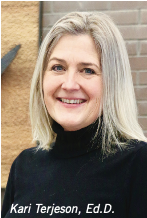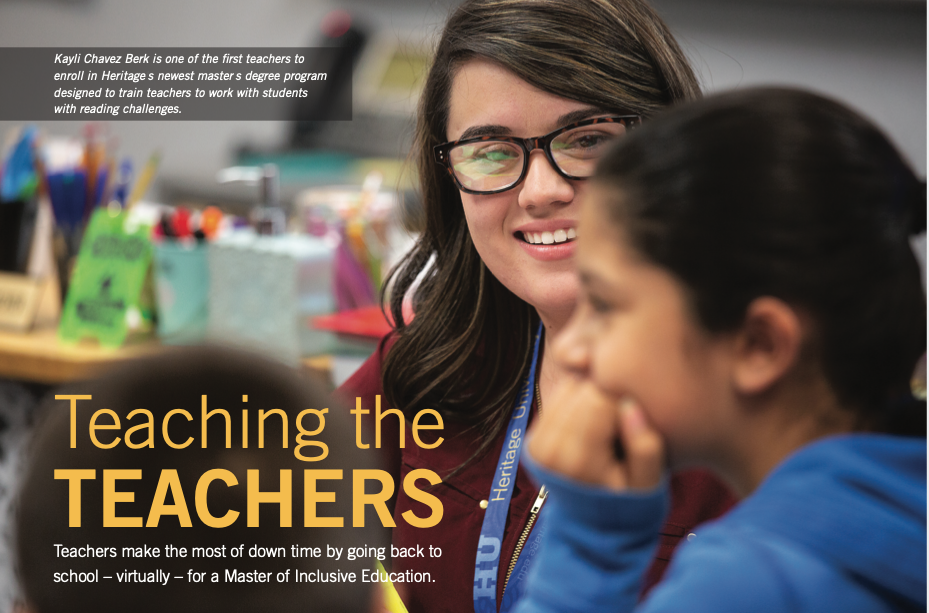Teaching the TEACHERS
As the COVID-19 pandemic became a worldwide reality last spring, teachers throughout the Yakima Valley found themselves delivering their students’ education from a distance. While they rose to the challenge, many also found themselves with unexpected downtime – and some decided to do some distance learning of their own.
One of them is Kayli Chavez Berk. She’s a teacher in the Sunnyside School District, who earned her bachelor’s degree in Education from Heritage in 2018. She was taking some courses to earn her English Language Learner (ELL) certification when she learned about the university’s newest master’s degree program in inclusive education.
“I was intrigued by the fact that the program was titled M.Ed in Inclusive Education, and I wanted to learn more about what exactly the program had to offer. When I learned that it would include coursework covering ELL, dyslexia, and cultural competence, I was immediately hooked. These are areas I am personally passionate about in regard to teaching practices and assessment,” she said.
Chavez Berk is one of the earliest adopters of Heritage University’s new master’s degree program, one that can be completed entirely online – or involve no class time at all.
When they’ve earned their degree, Chavez Berk and other master’s-level teachers will have two endorsements: the first, English as Second Language (ESL), English Language Learner (ELL), or Bilingual Language Educator (BLE); and the second, a Reading Endorsement.
The ESL/BLE Endorsement includes a strong focus on building a culturally competent teaching practice; the Reading Endorsement features a heavy emphasis in both assessment and instruction for students with dyslexia.
For their higher level of education and advanced teaching ability, educators will receive an immediate and significant boost on their school district’s salary schedule, as well as enhanced job security.
Most important, when they are finally reunited with their students, they will have a greater depth of knowledge to help the growing population of students who need teachers with the most effective teaching skills.
STATE REQUIRING ADDITIONAL EXPERTISE
As difficult as the “great pause” has been, the break in teachers’ schedules could not have come at a better time for this online educational opportunity, said Kari Terjeson, chair of Heritage’s Teacher Preparation Program.
Two years ago, Washington lawmakers passed a bill that, among other things, requires school districts statewide to screen children for signs of dyslexia. They are required to start doing so beginning the this fall.
The bill had a bit of its genesis more than 20 years ago in Seattle when seven-year-old Eileen Pollet was diagnosed with severe dyslexia. It was a relatively early diagnosis, and she was fortunate to have had more help available than many students receive. Yet despite her teacher’s dedicated effort, she wasn’t learning to read.
“Her teacher devoted 30 minutes a day three times a week before school to helping her learn to read,” said Eileen’s father, Gerry Pollet. “But she simply had never been given the training to teach a child with dyslexia how to read.”
As a member of the Washington House of Representatives representing the 46th District, Pollet’s experience as a parent led him to champion numerous education bills over his 20-year political career. Working closely with the Washington Branch of the International Dyslexia Association, the State Superintendent of Public Schools and others, Pollet drafted Washington Senate Bill 6162. It was voted into law in 2018, requiring every child from kindergarten through second grade to be progressively assessed for reading challenges and those with dyslexia provided with multi-tiered teaching support.
Screening tools and a road map for teaching students with learning challenges have been identified and quantified, Pollet said.
“Now, teachers have to be trained.”
The vast majority of colleges and universities are not yet beginning to plan for how – or if – they will provide the training.
That’s why Pollet finds Heritage’s early adoption of teaching the necessary skills so encouraging.
“Heritage not only understands the research and recognizes the need for this additional training, but faculty and administration are willing to put it into action.”
Because the ultimate responsibility to train teachers to identify and be able to teach children with dyslexia is with the school districts, teachers who come prepared with the training will be in demand.
In addition to the more thorough identification process, teachers in fall 2020 and beyond will need to work with students differently. School districts will be required to teach children with dyslexia in the regular classroom, not in a special education classroom.
HERITAGE HISTORY OF TEACHER TRAINING
Heritage is one of only two universities in the West Coast region to offer this master’s degree program. That’s unique, said Terjeson, but it’s not surprising.
“Heritage has always done what it takes to train teachers, especially to be able to teach marginalized students. Innovation in education is part of the tradition of our College of Education. It’s part of the Heritage mission and vision, the basic heart of Heritage.”
It applies to the other endorsement as well, which prepares teachers to teach students with a variety of language challenges. The degree offers both the ELL endorsement in which a teacher does not speak Spanish but works with non-English speaking students, as well as the BLE endorsement for teachers who are literate in both languages.
“This master’s degree is really about a multitude of language barriers. The ELL/BLE endorsement that’s offered as part of this degree is designed to ensure that all students with language challenges, due to second language acquisition difficulty, are considered,” said Terjeson. “And, because we serve indigenous and Latinx communities, it’s imperative that cultural competency is embedded in everything we do.”
It is this comprehensive approach to building teachers’ skills to work with students facing a multitude of language barriers that attracted Chavez Berk to the program. In the two years that she’s been teaching, she’s worked with many students who struggle to learn.
“Within the classroom, it is very common to work with students who have learning challenges and reading difficulties due to their way of processing information as well as their diverse language backgrounds. I have seen firsthand how many try so hard to succeed but are unable to because they are not given a chance to do so, or are not supported in the way that they need. As a result, they are not able to learn to their fullest potential,” she said. “Learning how to help these students overcome their specific challenges is definitely a motivating factor for me to enroll in this program. I choose to be part of this program not just to add another degree to my resume or bump me up on the pay scale. I am doing this to help increase my knowledge and skills to enhance the education can provide for my students. They are what matter most to me, and they deserve the best.”
DETAILS ABOUT THE PROGRAM
With total cost through the competency-based option of Heritage’s new master’s program at just under $15,000, it’s an investment that provides significant returns. In the State of Washington, a teacher with a master’s degree earns on average $10,000 more per year than his or her counterparts without one.
Teachers already in the classroom are best positioned to benefit from the additional education, said Terjeson.
“They are uniquely prepared to identify students with reading difficulties, understand the appropriate interventions, and be able to implement best practices for designing and delivering instruction. It behooves all teachers to have this training/ education, not just those who teach reading. It provides professional development and growth opportunities.”
Heritage’s accrediting body approved the program to be offered through a variety of models: face-to-face, online and competency-based, meaning teachers almost anywhere can take the courses and earn this degree. How students complete each course offering is interchangeable.
“Students can take classes online, and they can do face-to-face coursework, but there’s also an option to actually not take the courses,” says Terjeson. “If you believe you already have the training and experience to challenge the competencies for one or more of the micro-credentials in each course, there’s an option to prepare portfolio evidence and pass an objective exam to demonstrate mastery of the associate competencies. You can essentially challenge the requirements.”
In addition to the master’s degree offering, candidates can also take an endorsement-only route. Each endorsement consists of 16 credits.
For more information on this program, visit heritage.edu/inclusive-education.

